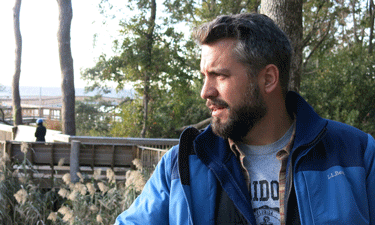 NRPA’s headquarters is full of people who are dedicated to conservation and public lands, and James Politte is one of the staff’s most passionate champions for nature. By day, he works as the webmaster for NRPA’s websites and online resources, and in his free time, he serves as president of a friends group for a 725-acre nature preserve in Loudoun County, Virginia. We caught up with Politte to learn more about his career motivations, his volunteer endeavors and his pervading love for natural spaces.
NRPA’s headquarters is full of people who are dedicated to conservation and public lands, and James Politte is one of the staff’s most passionate champions for nature. By day, he works as the webmaster for NRPA’s websites and online resources, and in his free time, he serves as president of a friends group for a 725-acre nature preserve in Loudoun County, Virginia. We caught up with Politte to learn more about his career motivations, his volunteer endeavors and his pervading love for natural spaces.
Parks & Recreation magazine: Tell us a little about your day-to-day job.
James Politte: I work with pretty much all of the departments. Within the organization, I’m not only working on public-facing websites, I also manage the intranet. Another part of my job is the analysis side. I work closely with marketing if they want to track campaigns to help show the return on investment of their efforts. IT generally does things behind the scenes to make things run as smoothly as possible for the user and for staff, and we’re always looking at continuous improvement in the service we provide and the ease of use of technology. We also try to bake in some time for creative thought and are constantly scanning other technology resources and other associations to make sure we’re keeping up with the latest trends.
P&R: Tell us how your volunteer work at Banshee Reeks Nature Preserve complements what you do at NRPA.
Politte: Banshee Reeks is a real gem in Loudoun County that a lot of people around here don’t know about. It’s got a little bit of everything, from a variety of different butterflies to wild turkey. It has more than 20 miles of trails, and frontage along Goose Creek. In every season, you’ll find something there to spark your interest — bluebells in spring, and native wildflowers and grasses in the wildflower meadow. Friends of Banshee Reeks is a small volunteer organization. We’re trying to grow it and increase awareness. I think that work meshes well with what we’re doing at NRPA with our pillars in Conservation and Health and Wellness — it offers opportunities for being active, enjoying the outdoors, land management practices and preserving habitat. A lot of people feel you have to travel far to find beauty, but a lot of times it’s in your backyard.
P&R: Speaking of backyards, I’ve heard that yours is practically a nature preserve in and of itself. Care to share some details?
Politte: I believe in planting natives wherever possible, and I see my property [in Sterling, Virginia] as an oasis for myself personally and for the wildlife in the area. There’s a band of woods behind my house with a stream. It’s not much, but there’s a fox I hear at night and an owl, plus bats fly over, and occasionally a deer (or five) will visit. One of the reasons I bought where I did was because of the environment.
I plant things I know will bring in the bees and the butterflies, and I have three or four types of milkweed that I grow. I grow various salvias that the ruby-throated hummingbirds enjoy, and I maintain a bluebird nest box (occasionally subleased by wrens). I have a suet feeder with a tail prop so you can get larger woodpeckers, and I’ve had hairy woodpeckers and red-bellied woodpeckers. My goal is to get a pileated woodpecker to visit, but they’re very shy. The bird I’ve been most excited about recently is the yellow-rumped warbler, which has come back a couple of times. My biggest consternation has been a mockingbird that has been chasing off other birds and claiming my feeders for its territory.
P&R: Anything else you’d like to share?
Politte: I feel the work that park and rec professionals do is really underappreciated and very important to communities and families. It’s unfortunate that there aren’t a lot of things you can do for little or no money, but for getting outside and recreating when you have the space to do so, especially with growing populations, it’s vital to retain some of these green spaces. I have gone to a lot of national parks, but I have felt that there’s more of an opportunity for solitude and reflection at state and local parks — sometimes when you’re just going for a walk in the park or sitting on a bench and listening, amazing things can happen.
My grandparents had a farm in Missouri that had lakes, and we’d go fishing and do fun stuff outdoors. We don’t have that farm anymore, but parks have helped fill that void.
Danielle Taylor is the Executive Editor of Parks & Recreation magazine.

